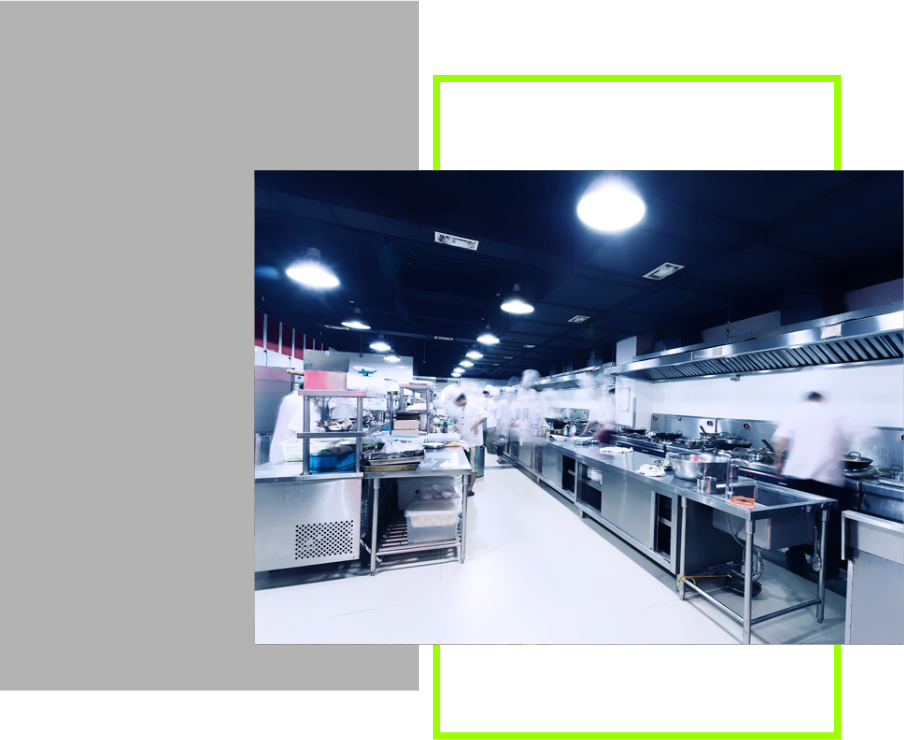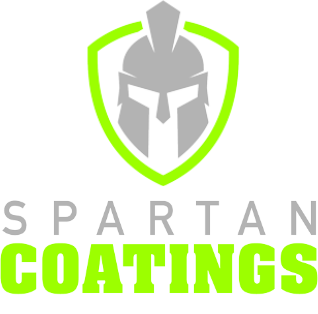
Commercial Kitchens

Commercial Kitchens
Spartan Coatings, a distinguished provider of floor coating solutions, offers specialized services in commercial kitchen floor coatings that are essential for businesses seeking durability, safety, and aesthetic appeal in their kitchen environments. The commercial kitchen, a hub of constant activity and frequent spills, demands a flooring solution that not only withstands the test of time but also maintains a safe and hygienic space for food preparation. Understanding these unique requirements, our company has dedicated its expertise to delivering top-notch polyurea and epoxy coatings finished with a polyaspartic topcoat, ensuring that your commercial kitchen's floor remains resilient, safe, and visually pleasing.
Superior Properties Of Polyurea And Epoxy Coatings
The choice of polyurea and epoxy coatings for commercial kitchens is rooted in their outstanding properties. Polyurea, known for its rapid curing time, exceptional durability, and resistance to extreme temperatures, makes it an ideal choice for environments that experience constant foot traffic and heavy equipment usage. Its seamless and waterproof nature prevents the accumulation of harmful bacteria and mold, a crucial aspect in maintaining kitchen hygiene. Epoxy coatings, on the other hand, are celebrated for their robustness, chemical resistance, and ease of maintenance. When combined, these materials create a floor coating system that not only endures the rigors of a commercial kitchen but also contributes to a cleaner and safer workspace.
The final layer of polyaspartic coating is what sets our floor solutions apart. This topcoat adds an extra layer of protection, ensuring the longevity of the floor. Its rapid curing time minimizes downtime in busy kitchen environments, allowing for a quicker return to operations post-application. The polyaspartic topcoat is also UV stable, preventing yellowing over time, and provides a high-gloss finish that enhances the overall appearance of the kitchen floor. This combination of functionality and aesthetics is a testament to our commitment to delivering quality floor solutions that cater to the specific needs of commercial kitchens.
Tailored Application And Maintenance For Optimal Performance
Our process of applying these coatings is meticulous and tailored to each kitchen's unique layout and operational needs. Initially, our skilled team thoroughly prepares the existing floor surface, ensuring it is clean, dry, and free of any contaminants that could hinder the adhesion of the coating. This preparation is crucial as it lays the foundation for a long-lasting and durable floor. Following this, the polyurea basecoat is applied, forming a solid and impermeable barrier against moisture, chemicals, and physical impacts. The epoxy layer is then added, providing additional strength and resilience. The process concludes with the application of the polyaspartic topcoat, which seals the underlying layers and adds a final touch of durability and shine.
Safety is a paramount concern in commercial kitchens, and our floor coatings are designed with this in mind. The texture of the coatings can be adjusted to create a non-slip surface, reducing the risk of slips and falls, a common hazard in busy kitchen environments. This feature is particularly important in areas prone to spills, such as near sinks and cooking stations. Moreover, our coatings are low in volatile organic compounds (VOCs), making them a safer choice for kitchen staff and the environment.
Maintenance of these coated floors is straightforward and cost-effective. The seamless nature of our coatings means there are no cracks or crevices where dirt and grime can accumulate, making cleaning a hassle-free task. Regular sweeping and mopping are typically sufficient to maintain the floor's appearance and hygiene. Additionally, the durability of the coatings reduces the need for frequent repairs or replacements, offering long-term cost savings.
Spartan Coatings understands that every commercial kitchen has its unique demands and style preferences. Therefore, we offer a range of colors and finishes to suit different aesthetic requirements. Whether you seek a classic, understated look or a bold, vibrant floor that reflects your brand's personality, our team can tailor the coatings to match your vision.
In conclusion, our polyurea and epoxy coatings finished with a polyaspartic topcoat are an exemplary solution for commercial kitchens. They offer a blend of durability, safety, ease of maintenance, and aesthetic flexibility that is hard to surpass. At Spartan Coatings, we are committed to delivering floor solutions that meet the highest standards of quality and performance, ensuring that your commercial kitchen remains a safe, efficient, and inviting space for years to come. Our team's expertise, combined with our dedication to customer satisfaction, makes us a trusted partner in enhancing the functionality and appeal of your kitchen floors. Contact us today for an estimate.
Frequently Asked Questions
Q1: How does the thermal expansion behavior of polyurea and epoxy coatings affect their performance in commercial kitchens with varying temperature ranges?
A1: Polyurea and epoxy coatings are formulated to handle temperature fluctuations common in commercial kitchens. Polyurea, renowned for its flexibility, accommodates thermal expansion and contraction well, making it less prone to cracking under temperature changes. Epoxy, while slightly less flexible than polyurea, still maintains good stability under normal kitchen temperature ranges. The combination of these materials, topped with a polyaspartic coating, ensures a resilient surface that withstands the thermal stresses of a typical commercial kitchen, including areas near ovens, stoves, and freezers.
Q2: Can the application of a polyaspartic topcoat over epoxy and polyurea layers alter the acoustic properties of a commercial kitchen floor?
A2: The application of a polyaspartic topcoat over epoxy and polyurea can slightly impact the acoustics of a kitchen floor, primarily by contributing to sound dampening. These coatings, by their seamless and slightly elastic nature, can absorb and reduce some of the surface noise typical in a busy kitchen, like the sounds of foot traffic, dropped utensils, or moving equipment. This effect, while not dramatic, can contribute to a marginally quieter and more comfortable working environment.
Q3: Question: How do polyurea and epoxy coatings interact with existing microbial ecosystems on kitchen floors, and what are their implications for long-term hygiene maintenance?
A3: Polyurea and epoxy coatings provide a non-porous, seamless surface that is inhospitable to microbial growth. Unlike tiled floors with grout lines or untreated concrete, these coatings do not offer crevices for bacteria and fungi to proliferate. This significantly reduces the microbial load on the floor surface. However, regular cleaning and maintenance are still essential to ensure hygiene. The coatings are resistant to common cleaning agents, allowing for effective sanitization without degrading the floor's integrity. Over time, this leads to a cleaner, more hygienic kitchen environment, as the likelihood of microbial contamination from the floor is greatly diminished.
All Rights Reserved | Spartan Coatings

